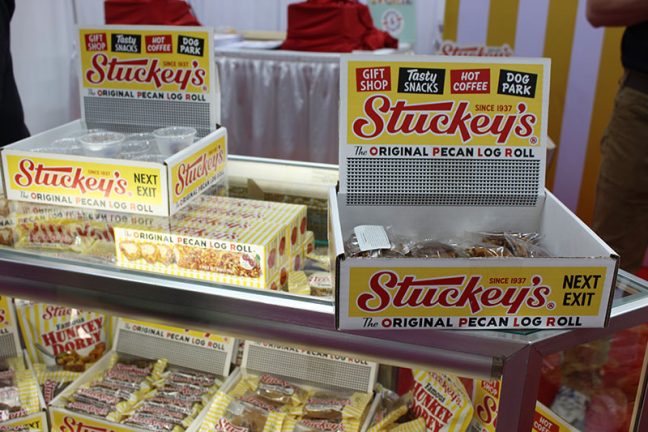Stephanie Stuckey, chair and co-owner of Stuckey’s, was one of the speakers during the recent Sweets & Snacks Expo, sharing with the crowd how she revived her grandfather’s company and offering tips to market a brand’s products on a “scrappy” budget.
“I know a thing or two about comebacks,” Stuckey said. “I had a completely different career from candy until just four years ago. I’m an attorney, and I spent my life in public service.”
Rebuilding brand
Stuckey had the opportunity to purchase the company her grandfather started from its previous investors. While she did not understand the business or what it takes to run a company, she traded her “very strategic” profession for a company that was a “hot mess and six figures in the red.”
“I [was] very much in the trenches with this brand, trying to revive it and bring it back,” she said. 
In its 1970s heyday, the Stuckey’s brand was known as a “roadside oasis.” Well before Cracker Barrel or Buc-ee’s became household names, Stuckey’s was the first roadside retail chain. At its peak, the company had 300 stores in 40 states, as well as a distribution business, trucking company, manufacturing facility and billboard sign painting company.
However, when Stuckey took the brand back over in 2019, just 12 original locations still stood, and many were run down.
The company previously made all its candy products in-house, but those facilities had been shuttered for about 20 years. Pecans were outsourced from Mexico, even though the company is based in Georgia – the No. 1 state for pecan production.
“My first week on the job … we had a rented warehouse in Eastman, Georgia, and we sourced all those kitschy souvenirs that you [used to] see at Stuckey’s. The candy that was outsourced, it would go to this warehouse. We would ship it to those handful of stores that were still around sinking further, further in debt.”
Stuckey shared how many people close to her in the community asked why she was taking over the company, sinking her life savings into trying to resurrect the brand. Her grandfather’s legacy was the reason she fought hard for Stuckey’s and why she continues to do so today.
Stuckey’s grandfather established the company during the Great Depression, dropping out of college to work on his family’s cotton farm in rural Georgia. He started by selling pecans on the side of the road, and noticed how people would pull over asking for a restroom, gas or hot snack. Within a few years, he was able to save to open his first Stuckey’s in Eastman, Georgia.
Notes from past
One asset that helped Stuckey revive the brand was receiving her grandfather’s papers.
“Learning his story helped me understand how I could rebuild this family business,” Stuckey said. “Maybe I didn’t have an MBA, but in some ways I feel like I had something better. I inherited grit and integrity from him, and I inherited his papers and learned his story.”
From the papers, Stuckey learned how her grandfather had to pivot the business during World War II, when products such as gas were rationed. He transitioned to selling candy. But in order to do so, he had to learn about the manufacturing process, packaging and food safety.
“If he had just continued to do what he was doing, he would have failed,” Stuckey said.
When the war ended, the “era of the great American Road Trip” started, and he began opening stores again at a faster clip than before. Also during this time, the U.S. interstate highway system came to fruition and “threatened to completely bankrupt him.”
“Here’s the bottom line about change that I learned from my grandfather,” Stuckey said. “When change happens, you don’t just accept it, you embrace it.”
Stuckey’s grandfather moved all of his stores to the interstate to prevent them from being bypassed by those seeking a faster route. He also established a partnership with Texaco to exclusively sell the company’s gas, receiving a percentage of every gallon sold.
What brands can learn
Stuckey shared one story about a tour that she did early in the rebuilding process, visiting a store in Marion, Arkansas, that was in disrepair. She called this her “rock-bottom moment,” after realizing that she was in over her head.
Yet, she walked into the store and spoke to some of the customers, asking why they were there. One said while Stuckey’s had seen some better days, he remembered what an amazing place it had been when he was a kid.
“For those who are trying to figure out how to market, how to brand, how to sell your product, this is what it’s all about – creating an emotional connection,” Stuckey said. “The way that you survive the hard times is that you build up goodwill with your customers, employees and vendors … they’re going to be in your court because they remember what a great brand you are.
“I had to embrace the fact that I didn’t have the resources or the capacity, the financing to revive the stores, but I could get the resources to do what my grandfather started out doing at that little roadside stand in 1937.”
She noted that brands should “think about what is the story connected with your brand that’s beyond just what your product is or what your services are, that people can have an emotional connection to.”
In addition, brands shouldn’t be afraid to market themselves and “be out there in as many ways as possible.” Any story a brand tells should be “authentic, interesting and relevant.”
With Stuckey’s, she used social media to highlight the emotional connection of the brand and its rebuilding journey. She also reached out to media outlets.
“You just have to be real. That’s what people want,” she said “They want authenticity, and they want honesty. I would also say partnerships are the gateway to scale. We align ourselves with different types of products to try to help scale our brand.”
[RELATED: Despite Financial Restraints, Treats Industry On Move]

